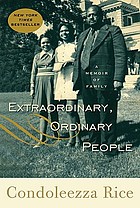Extraordinary, Ordinary People is a great title, but inapt for this book. Toward the end Rice quotes the Greatest American Hero theme song "Believe or not, I'm walking on air." (YouTube link) I think a more accurate title in the same vein, would have been "Believe it or not, it's just me." Whether you love or hate her (and I'm in the latter camp, though I'd probably say "fear/revile," rather than "hate"), you have to acknowledge that Rice is in no way ordinary. Most people know she excelled in piano, but did you know she was also a competitive figure skater in her adolescence? Ignoring her political accomplishments (or crimes, if that's how you see them), she is a superstar solely as an academic, having achieved the rank of full professor and provost at Stanford University before she was 40. Also, although Rice clearly loves and appreciates her deceased parents and extended family, this is not a memoir of family; it's an autobiography from birth (preceded with a little family history) to the Supreme Court's 5-4 decision in favor of W. To me it's also interesting as a memoir of the Birmingham Black middle class.
Many will be mystified, and never satisfied, as to how a Black woman from segregation era Birmingham, Alabama could possibly have grown up to become a staunch Republican. Members of her family were Republicans for one reason or another, but Rice herself started as a Democrat and voted for Jimmy Carter. She switched sides because she was disgusted with how Carter handled the Soviet Union/Afghanistan and the Olympics. Whatever. She's a brilliant woman and entitled to her point of view. Sometimes I might even agree with it. Rice is a supporter of affirmative action and describes herself as one of its beneficiaries.
The main thing for you to know is that the book is a pretty good read. I was nervous going in, because the table of contents with its named chapters (e.g. "Johnny, It's a Girl!," "I Need a Piano!," and My Parents Were Teachers) and the Pollyannaish Author's Note seemed a little stilted or juvenile. It seems in the beginning like she's trying to please everyone, being a good girl, which makes for shallow writing. She doesn't necessarily get more revealing as the book goes on, and everything is underscored with false modesty, but she still manages to make you care about her parents and her own successes. Even with that lack of depth and politeness, she does give a few people a hard time, which I found surprising from someone so accomplished in politics and diplomacy. It's humanizing to see her still so pissed at the guy she thinks screwed her father over in the eighties. She calls the book a memoir of family perhaps because it ends when her parents do. I'm sure someone could do a fascinating study of the Rice family relationships. As an only child, Rice was the focal point of the family. Her priority status is exemplified by being given the master bedroom with its own bathroom as an adolescent because she "was getting to the where that kind of thing mattered." Ma and Pa Rice repeatedly made sacrifices to forward their daughter's success. Prioritizing your kid is not a terrible thing, but it does set up a weird family dynamic and I think puts a lot of pressure on the child and maybe just a little warps her into a monster like the kid from the It's a Good Life Twilight Zone episode.
I'm not going to tag this as highly recommended, but I do think it's worth a read.
Quotes and tidbits
The Rices were neighbors with the Netanyahus in Denver, even attending a Passover Seder at their house once.
On affirmative action:
Quoting her father, "The university should commit itself to the proposition that it is possible to have varying entrance standards, but only one exit or graduation standard."
"Contrary to what has sometimes been written about me, I was and still am a fierce defender of affirmative action of this kind. Why shouldn't universities use every means necessary to diversify their faculty? And frankly, any new assistant professor, no matter how promising, is a risk: some will succeed and some will not. Tenure is a proving ground. A lot happens between hiring and judgment day." (Emphasis added. Condoleezza Rice is the Malcolm X of affirmative action!)
Her Republican father was fascinated by the radical left, hosting people including Julian Bond, Stokely Carmichael, Dick Gregory, Fanny Lou Hamer, and Tommy (sic) Smith in his "Black Experience in America" class. Carmichael was a regular at the Rice dinner table.
On race and becoming a Republican, "'I would rather be ignored than patronized.' I said, pointing to the tendency of the Democratic Party to talk about 'women, minorities, and the poor.' I hated identity politics and the self-satisfied people who assumed that they were free of prejudice when, in fact, they too could not see beyond the color to the individual."
